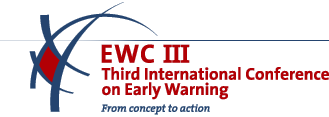|
Plenary Opening Session
10.00 Welcome address by the Federal Minister for Foreign Affairs of Germany, Dr. Frank-Walter Steinmeier
10.15 Opening address by United Nations Under-Secretary-General for Humanitarian Affairs, Jan Egeland
10.30 Message from the Mayors' Conference on Early Warning, delivered by Juan del Granado Cosio, Lord Mayor of the City of La Paz
10.35 Keynote address, Katherine Sierra, World Bank, Vice-President Infrastructure
10.55 Organizational matters
11.00 Plenary adjourns |
|
Moderator: Thomas Kausch
15.00 Overarching issue: A global early warning system; who is responsible and how can it be achieved?
International action and governance to build reliable systems worldwide, to energise partnerships, and to capitalize on opportunities and plug the gaps.
Keynote: Sir David King (Chief Scientific Advisor, UK)
15.30 Session 1: EARTH
Shaking, blasting and sliding - ready and resilient for the hazards of the Earth
During this session, the following projects will be presented that illustrate problems encountered and solutions offered in relation to earthquakes, landslides and volcanic activity:
- From Local Action to National Cooperation: National and People Centred Early Warning System in Tajikistan, submitted by the Ministry of Emergency Situations
- An Early Warning System Towards Hazards of the Tungurahua and Cotopaxi Vocanoes, Province of Tungurahua, Ecuador, submitted by Junta Provincial de Seguridad Ciudadana y Defensa Civil de Tungurahua
- A Warning Analysis Network and Site for Iran, submitted by the National Disaster Task Force of the Ministry of Interior
- Flooding and Landslide Early Warning System in the City of La Baz, Bolivia, submitted by the Municipality of La Paz
- Short Presentation of Geographical Analysis of the Watershed of the Mocoties Valley and Urban Local Plan for Sustainable Development for the Community of Santa Cruz de Mérida, submitted by Alcadia de Santa Cruz; Universidad de Los Andes; Universidad Simón Bolivar, Venezuela
Experts in relevant areas will contribute to the presentation and participants will be invited and encouraged to take part in the discussions. From the exchange, the moderator will draw out features that deserve to be brought into the conference outcome documents.
|
11.15 Opening of the Symposium by the Secretary-General of the World Meteorological Organization,
by Michel Jarraud
12.00 Session 1: MULTI-HAZARD APPROACHES
Keynote: Promoting risk-wise behaviour: an integrated strategy for reducing vulnerability and improving resiliency,
by Helen M. Wood
In this session, participants will listen to twelve short presentations on subjects related to multi-hazard approaches, in different parts of the world, using various technologies. A discussion panel will conclude the session. |

